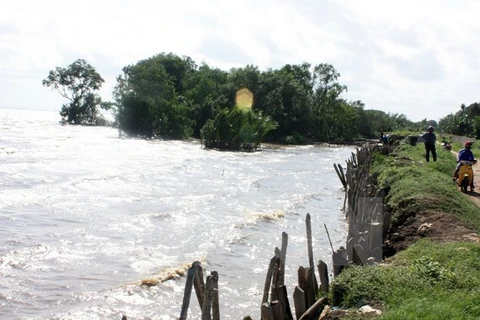 Map showing the impact of a one-metre sea-level rise in the Mekong Delta area. (Source: challengetochange.org)
Map showing the impact of a one-metre sea-level rise in the Mekong Delta area. (Source: challengetochange.org) Mekong Delta (VNA) – The Mekong Delta, known for its fertility and rice fields, has been facing enormous challenges posed by climate change and upstream activities, according to environmental officials.
The Mekong Delta, with an area of 3.96 million hectares and a population of 18 million, contributes50 percent of Vietnam’s total food output. The region provides 90 percent of the country’s export rice, 70 percent of fruit and 65 percent of aquatic products.
Nguyen Xuan Hien, Director of the Southern Institute for Water Resources Planning (SIWRP) , said the region’s diverse natural resources range from fresh water and saline water to soil and abundant plant and animal species.
Climate change events such as sea water rise, drought andsaline intrusion as well as upstream activities have been eroding these advantages, which may cause heavy economic lossesand threaten local people’s livelihoods.
Minister of Natural Resources and Environment Tran Hong Ha said the Mekong Delta is one of the five deltas most vulnerable to climate change in the world.
According to the World Bank’s assessment, Vietnam is one of the five countries hardest hit by climate change, with aone-metre rise in sea levels likely to affect 10 percent of population and cause losses equal to 10 percent of GDP in delta regions.
The consequences of climate change to Vietnam are serious and will threaten the country’s efforts to reduce poverty and achieve sustainable development.
Water resources, agriculture and food security, health, deltas and coastal areas will be impacted most by the phenomenon.
Associate Prof. Dr. Tran Hong Thai from the National Hydro-Meteorological Service, said economic activities in the upstream Mekong River would alter the water current and volume in the region in an unpredictable way.
Hydro-electric dams in the upstream Mekong River will cause water shortages in the dry season and floods in the rainy season.
Thai said the water volume in the dry season may fall by 30 billion cu.m and climate change could cause water shortages or increase flooding.
The Mekong Delta includes Can Tho city and 12 provinces - Long An, Dong Thap, Tien Giang, Vinh Long, TraVinh, Ben Tre, An Giang, Hau Giang, SocTrang, Bac Lieu, Ca Mau and Kien Giang. - VNA























